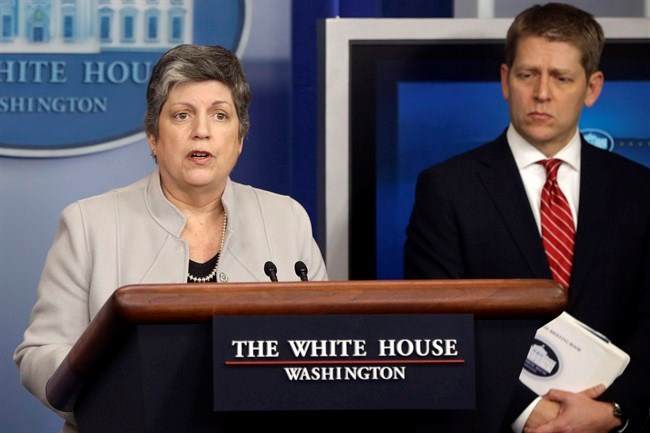WASHINGTON - Janet Napolitano, the Obama administration's homeland security chief, warned Tuesday that the looming array of U.S. spending cuts known as sequestration will cause pain for Canadians, in particular at the busy Canada-U.S. border.
"Sequester will be felt up there because there's only a few big crossing places for trade on the Canadian-U.S. border and they're really important crossing places," she said at the Brookings Institution think tank.
"In fact, trade-wise, they're probably the No. 1 or 2 crossing places in the world. As sequester evolves and we have to furlough people who are port officers, and not fill vacant positions, and not pay overtime, we're unfortunately going to see those lines really stretch."
The equivalent of 5,000 border patrol agent positions will be cut if Congress fails to reach a deal to avert sequestration, Napolitano noted.
“It means less overtime and the ability to hire port officers, so longer lines there. It means really the same at the TSA (Transportation Security Administration). So longer lines there,” said Napolitano, who buried her head in her hands when asked about the impact of sequestration on her growing department.
With the clock is ticking on sequestration, set to kick in Friday with $85 billion in immediate reductions for this fiscal year, federal departments and agencies are in the process of implementing their budget-slashing plans.
The Pentagon alone has been forced to impose $55 billion in cuts this fiscal year, and plans to require up to 800,000 civilian employees to take unpaid time off.
In addition to the 5,000 border patrol agents, the U.S. Customs and Border Protection is preparing to reduce its work hours by the equivalent of 2,750 inspectors as well, meaning cargo inspections at the border could drag on interminably for Canadian exporters.
Obama administration officials have warned of serious delays for air travellers, too, as a host of control towers and airports are shuttered, creating a ripple effect across North America.
President Barack Obama is travelling the country to warn of the repercussions if Congress doesn't reach a deal to put the brakes to sequestration; his cabinet secretaries are making the rounds making similar arguments.
But there appears to be faint hope that any deal will be struck by Friday. Republicans have said they refuse to make concessions to Democrats on raising revenues or closing tax loopholes, and seem poised to allow the country to topple over the latest fiscal cliff to loom on the horizon for Americans.
Obama assailed Congress on Tuesday for its failure to act. In a speech to workers at a ship-building factory in Virginia, he called sequestration "a dumb way of doing things" that threatens to stifle the fragile U.S. economic recovery and erode the country's military preparedness.
"The longer these cuts are in place, the greater the damage," he said, calling on Republicans to work with him on a compromise.
The president was slated to meet with two top Republican senators, John McCain and Lindsey Graham, later in the day, ostensibly about immigration reform. But the White House said sequestration would also be a key topic of discussion.
Graham ruffled the feathers of his fellow Republicans earlier this week when he said he'd be willing to consider $600 billion in new revenue increases as part of a deal to stop the sequester.
Already the impact of sequestration was being felt in the United States. The country's Immigration and Customs Enforcement — an agency that's part of Napolitano's department — announced Tuesday it had released hundreds of detained illegal immigrants who were being held pending deportation in order to cut costs.
While their cases work their way through the courts, the detainees — freed over the past few days — will be under court supervision.
They were released “in order to make the best use of our limited detention resources in the current fiscal climate and to manage our detention population under current congressionally mandated levels,” Gillian M. Christensen, an agency spokeswoman, said in a statement.
At the Brookings event marking the 10th anniversary of the Department of Homeland Security, Napolitano chided lawmakers for demanding her department commit more resources to border security and other public safety measures while failing to do anything to avoid the sequester.
"Trying to do both at the same time is really an impossible task," she said.



